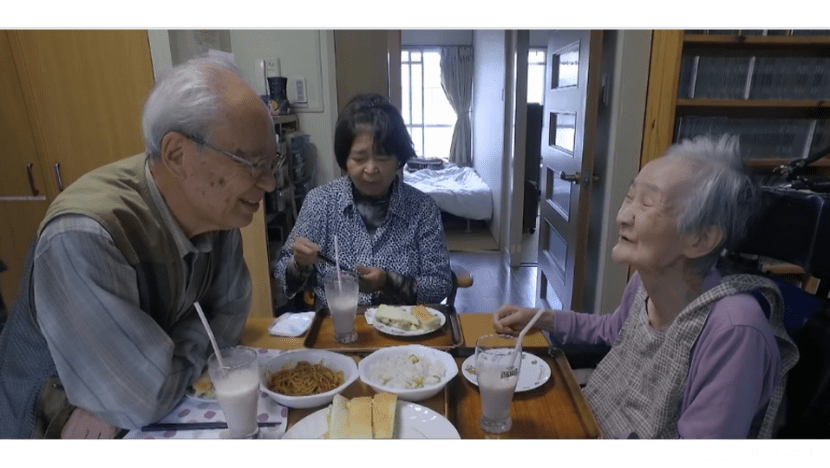Time bank lets Japan's seniors swop services for free - from cleaning to companionship
From mutual help schemes for seniors to men-only clubs, countries are finding ways for older folks to age actively and age in place, as Challenge Tomorrow shows.

JAPAN: When volunteer Mr Tatsumi Okabe, 78, meets Mr and Mrs Yagi for lunch once every month, he provides valuable companionship – particularly for Mrs Yagi, a usually-withdrawn and quiet 75-year-old with dementia, who brightens up whenever he comes by.
But that’s not all that happens.
Mr Okabe himself is chalking up points - which he can in turn use to ask other volunteers for help, such as with the housekeeping or gardening services, or even for just a lunch date.
This novel concept of time banking is Japan’s way of promoting self-sufficiency among its aging population, while keeping seniors active. The scheme also allays the fears of those who feel embarrassed about receiving services for nothing.
WATCH: How it works (1:22)
Mr Okabe and his wife are members of the Nippon Active Life Club which started in 1994 and caters to a mostly elderly segment. It’s a mutual help system based on time and points, not money.
Besides the points and the intangible benefits he gets from volunteering, Mr Okabe also gets tips from Mr Yagi on caring for a spouse with dementia - as his own wife too has a mild form of it.
This paying-it-forward time bank system benefits the 2 million elderly in Osaka who require only basic assistance, which is enough for them to live independently in their own homes instead of moving to care facilities.
Time banking is one of several schemes featured in an episode of Challenge Tomorrow this Sunday (March 12), which looks at how Japan, the United States, Australia and Singapore, are managing aging issues.
AGEING AT HOME, IN NEW YORK CITY
More countries like Singapore are looking at ways to help their ageing populations age in place. For instance, the island-state is planning to create a time bank type system, called Eldersave, by 2022.
Meanwhile it launched its first Active Ageing Hub last year, a one-stop centre with access to healthcare, grocery shopping and other assisted living services. Such hubs will be built in at least 10 new public housing estates.
Similarly in New York City, a unique programme encourages seniors to stay in their homes for as long as possible instead of moving to retirement villages.
The Naturally Occurring Retirement Community (NORC) is a multi-age neighbourhood or housing development where older residents can access health and social services at their doorsteps. These include two social workers on site, a full-time nurse, and free classes and activities tailored to their age group.
An apartment building can qualify for NORC funding if more than 42 per cent of residents are over the age of 60, said Ron Bruno, the executive director of Morningside Retirement and Health Services which administers an NORC programme.
He said: “I remember when I was working in a nursing home, when a young person walked through the doors, the older people’s faces would light up. They may not have seen a young person in weeks. So it’s a very unnatural setting.
“But a NORC truly is a natural setting where people of all generations live together.”
Shirley Davidson, 86, a resident at Morningside Gardens NORC, appreciates living in such an environment. “Being in a nursing home would be like death. Here, I have a beautiful view, I have friends and there are activities I can take part in,” she said.
MEN’S SHEDS IN AUSTRALIA
In Australia, the community decided to take on a more active role in tackling rising dementia and social isolation among elderly men.
They created Men’s Shed, the concept of a community group which shares resources, tools to work on projects, and interactions. Each shed has its own activities to appeal to local residents.
Ric Blackburn, executive officer of the Victorian Men’s Shed Association, said there were individuals living in loneliness and isolation but organisations didn’t know how to deal with it. “Instead of waiting around, the locals started Men’s Shed,” he said.
“Families and doctors were initially worried that (such persons) were going to get hurt or weren’t going to be looked after. (But) the men in the shed welcomed them, supported them and looked after them.
“It gives these men confidence and stimulation, and opportunities to develop friendships.”
This episode of Challenge Tomorrow airs Sunday, March 12, at 8pm (SG/HK).















